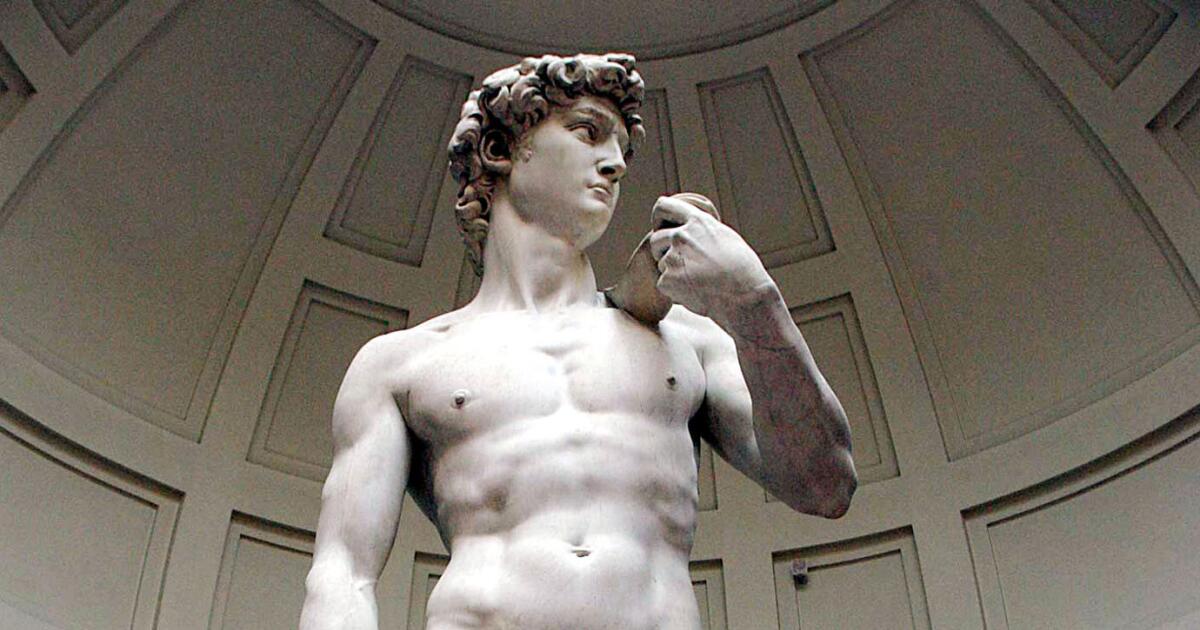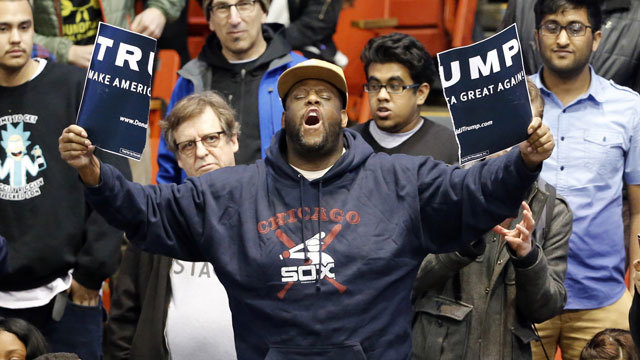
Michelangelo’s David is generally regarded as one of the supreme artistic creations in the history of the world. Housed in the Galleria dell’Accademia in Florence, the colossal statue is breath-taking, magnificent, and inspiring. A visit to see David should be a bucket list item for any art lover.
David was completed in 1504, and in the 700 years since it has become an iconic image. Like any iconic image in the modern world, David has been commoditized. You can buy fluorescent plastic reproductions of the statue, t-shirts of David blowing a bubble or David hoisting a wine glass, or other goods featuring various parts of his body or face. But . . . is that proper? Or, should Italy be able to protect the dignity of this monumental artwork, and prevent it from becoming the subject of the kind of trashy junk sold in souvenir shops?
That’s an important question, because the director of the Galleria dell’Accademia has been using an Italian law to stop commercial exploitation of images of David that she considers to be “debasing.” She has encouraged the state’s attorney office to bring lawsuits under Italy’s cultural heritage code, which protects artistic works from disparaging and unauthorized commercial use. In most countries, artwork falls into the public domain within a set period after the death of the creator–and once a piece falls into the public domain, people are free to make use of its image. Interestingly, Italy is one of many countries that has signed a convention recognizing that approach.
The world obviously doesn’t need more cheap plastic knock-offs of David any more than it needs more t-shirts of the Mona Lisa wearing sunglasses–but there are obvious issues of free expression and free speech that also come into play. Who is to decide what is to be considered “debasing” or disparaging, or what should be authorized? Should Monty Python, for example, have been permitted to use the image of Botticelli’s Birth of Venus in a hilarious and arguably disrespectful way in one of its shows?
I come down on the side of free speech on this issue, and I think the notion of allowing artwork to pass into the public domain within a reasonable period after the artist’s death makes sense. And, at bottom, I really don’t think that the commercial uses of David are “debasing” of the artwork itself. I think that David, the Mona Lisa, Van Gogh’s self-portrait, and other supreme artistic accomplishments can withstand some crass commercial profiteering. If anything, that cheap neon plastic statue of David might just cause someone to want to go see the awe-inspiring original, in all its glory.


 The theme of the Vice President’s address was the importance of freedom of speech and tolerance for different points of view, on college campuses and elsewhere. Many conservative commentators made fun of the students who walked out on Pence’s speech, deriding them as delicate “snowflakes” who simply couldn’t bear to hear opposing views and finding it paradoxical that the students would walk out on a speech that urged them to listen to other, opposing perspectives.
The theme of the Vice President’s address was the importance of freedom of speech and tolerance for different points of view, on college campuses and elsewhere. Many conservative commentators made fun of the students who walked out on Pence’s speech, deriding them as delicate “snowflakes” who simply couldn’t bear to hear opposing views and finding it paradoxical that the students would walk out on a speech that urged them to listen to other, opposing perspectives. Weirdly — or maybe not so weirdly — California chose option 3.
Weirdly — or maybe not so weirdly — California chose option 3.  A
A  Why did the woman suddenly engage in an act of vandalism? Because she hates Trump, and is angry about his crass comments about women, which remind her of her own experience with a crude boss who propositioned her for sex, and she thought that the number of yard signs supporting Trump were destroying the “equilibrium” of her neighborhood. She writes that she and her friends “felt assaulted by the number of signs. The idea of “cleansing” our streets seemed like the fastest way to restore balance and alleviate our election stress.” Now she regrets her conduct and recognizes that she momentarily snapped — and will have to face her day in court.
Why did the woman suddenly engage in an act of vandalism? Because she hates Trump, and is angry about his crass comments about women, which remind her of her own experience with a crude boss who propositioned her for sex, and she thought that the number of yard signs supporting Trump were destroying the “equilibrium” of her neighborhood. She writes that she and her friends “felt assaulted by the number of signs. The idea of “cleansing” our streets seemed like the fastest way to restore balance and alleviate our election stress.” Now she regrets her conduct and recognizes that she momentarily snapped — and will have to face her day in court. I don’t get the jersey-burning. Of course, under the First Amendment, Kaepernick has a right to protest and advocate for his position on important issues of the day, period. We all do. Although some people increasingly seem hell-bent on punishing and eventually criminalizing free speech, through speech codes and “safe zones” and other contrivances designed to protect our delicate sensibilities from unpopular views — and, of course, quash the expression of those views in the first place — every American still has a right to peacefully express their views on topics like racism. Kaepernick’s actions aren’t unAmerican; they’re quintessentially American.
I don’t get the jersey-burning. Of course, under the First Amendment, Kaepernick has a right to protest and advocate for his position on important issues of the day, period. We all do. Although some people increasingly seem hell-bent on punishing and eventually criminalizing free speech, through speech codes and “safe zones” and other contrivances designed to protect our delicate sensibilities from unpopular views — and, of course, quash the expression of those views in the first place — every American still has a right to peacefully express their views on topics like racism. Kaepernick’s actions aren’t unAmerican; they’re quintessentially American. The
The  The Trump event was on the University of Illinois-Chicago campus in the heart of the Windy City, where lots of Sanders supporters and activists are found. Progressive groups were already well organized in Chicago, because they’ve been routinely protesting against Democrat Chicago Mayor Rahm Emanuel and his police policies for months, so communications networks among groups were already established. And Trump’s message has so alienated many people that large groups were eager to join in the protest. The protest organizers came up with a plan, got thousands of protesters to show up and get into the Trump rally, and then when fights broke out the protesters got what their “#SHUTITDOWN” Twitter hashtag suggested — the Trump campaign pulled the plug and Trump himself never appeared.
The Trump event was on the University of Illinois-Chicago campus in the heart of the Windy City, where lots of Sanders supporters and activists are found. Progressive groups were already well organized in Chicago, because they’ve been routinely protesting against Democrat Chicago Mayor Rahm Emanuel and his police policies for months, so communications networks among groups were already established. And Trump’s message has so alienated many people that large groups were eager to join in the protest. The protest organizers came up with a plan, got thousands of protesters to show up and get into the Trump rally, and then when fights broke out the protesters got what their “#SHUTITDOWN” Twitter hashtag suggested — the Trump campaign pulled the plug and Trump himself never appeared. If we believe in free speech — and I fervently, passionately do — we should all speak out against any assault on free speech, much less an actual armed attack that leaves many people dead simply because they have expressed views that are inconsistent with one conception of Islam.
If we believe in free speech — and I fervently, passionately do — we should all speak out against any assault on free speech, much less an actual armed attack that leaves many people dead simply because they have expressed views that are inconsistent with one conception of Islam. Two recent articles address the issue and are worth reading. One is
Two recent articles address the issue and are worth reading. One is  The dissenting opinion in McCutcheon is at least as interesting as the majority ruling, however. In the dissent, Justice Stephen Breyer, joined by three other Justices, articulated a concept of “collective speech” and asserted that “the First Amendment advances not only the individual’s right to engage in political speech, but also the public’s interest in preserving a democratic order in which collective speech matters.” It’s not entirely clear what Justice Breyer means by “collective speech,” but he obviously believes that the interest in “collective speech” can override individual First Amendment expression.
The dissenting opinion in McCutcheon is at least as interesting as the majority ruling, however. In the dissent, Justice Stephen Breyer, joined by three other Justices, articulated a concept of “collective speech” and asserted that “the First Amendment advances not only the individual’s right to engage in political speech, but also the public’s interest in preserving a democratic order in which collective speech matters.” It’s not entirely clear what Justice Breyer means by “collective speech,” but he obviously believes that the interest in “collective speech” can override individual First Amendment expression.  Some people were struck by the fact that Paul, a conservative whose political inclinations have a distinct Libertarian flavor, would give a speech on a campus that has long been regarded as one of the nation’s most liberal, Democratic enclaves. In this case, he was addressing a topic — personal privacy, and domestic surveillance and intelligence-gathering activities that often seem to be unsupervised and uncontrolled — on which he was likely to find sympathetic ears. On some issues, the American political spectrum seems to be less a straight line than a circle, where the interests of the left and the right can meet. The concern about the growing intrusions of our spy agencies seem to be one of those issues.
Some people were struck by the fact that Paul, a conservative whose political inclinations have a distinct Libertarian flavor, would give a speech on a campus that has long been regarded as one of the nation’s most liberal, Democratic enclaves. In this case, he was addressing a topic — personal privacy, and domestic surveillance and intelligence-gathering activities that often seem to be unsupervised and uncontrolled — on which he was likely to find sympathetic ears. On some issues, the American political spectrum seems to be less a straight line than a circle, where the interests of the left and the right can meet. The concern about the growing intrusions of our spy agencies seem to be one of those issues.